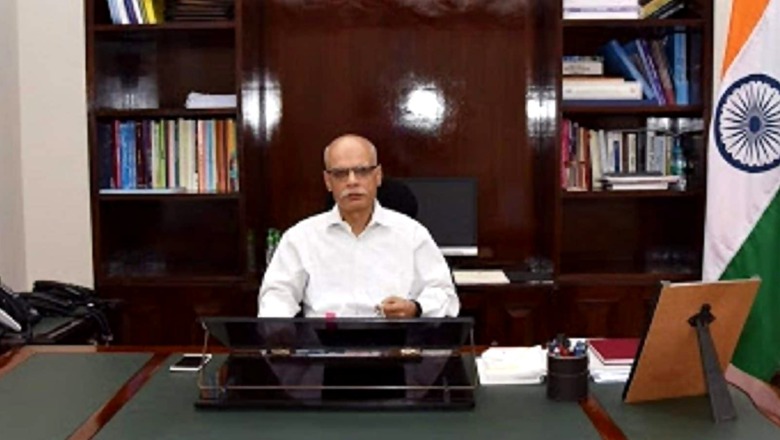
views
On the day the Taxation Laws (Amendment) Bill to repeal retrospective tax was passed by Lok Sabha, Revenue Secretary Tarun Bajaj said that the government was confident that companies like Cairn Energy and others will drop their arbitration against the centre.
Speaking to Moneycontrol in an exclusive interview, Bajaj said that the centre had waited for Vodafone and Cairn legal cases to reach their conclusion before making the move to repeal the tax, and that getting rid of retrospective tax does not take away the Sovereign’s right to tax.
“We have the power but it should not be used in the manner that it has been used. This is to be used very judiciously. This has to be used very sparingly,” Bajaj said.
Edited Excerpts:
Now that the government has brought in amendments to repeal retrospective tax, what is the next step? Are you in talks with Vodafone, Cairn and other companies? Are you confident they will withdraw their arbitration cases?
The next step is that we have to come up with rules of what undertaking they have to give us, but it is more or less known, as we have mentioned it in the main legislation as well. We are confident that the companies would be more than willing to come to us. And, in case, if somebody doesn’t come, then the fight will continue. But I would presume, unlike the government, unlike the sovereign, that stake in the sense of a bottom line and the top line is not for me or for my political executive, but for the corporate sector. So, if they (corporates) get a cash flow today, and an uncertain cash flow after 10 years, I think anybody will go for a cash flow right now. So, I am pretty confident that they would be coming forward. Additionally, one of the major parties –Cairn– has been in touch with us informally. Hence, I am sure they will. Out of Rs 8,100 crore that we have got through retrospective tax, I think Rs 7,900 crore odd is from them.
So, what is the next step with Cairn, since they are the biggest party to this. Will they drop the cases in Paris and New York, including the one against Air India?
Cairn have started the enforcement of the Paris decision. That should stop. Then there is an appeal process of the main arbitration case, that is still going on. There are domestic litigations as well. All of these need to be withdrawn from their side. So, it will be a clean slate from both sides.
Finance Secretary Somanathan had said that Rs 8,100 crore is the amount garnered so far through retrospective tax, out of which Rs 7,000 is from Cairn alone. How much of the total is the principal amount?
Cairn’s is Rs 7,900 crore. The entire Rs 8,100 crore is the principal amount.
As per Cairn’s own assessment, based on the International Court of Arbitration’s judgement, the damages sought are worth $1.2 billion, which roughly converts to Rs 8,900 crore. You expect this to be a sticking point?
Let us wait for them to come back because now we have laid down the act. So I don’t have the power to negotiate. I am bound by the legislation. If it gets passed by the parliament, then that is what I can offer them. I can’t offer them anything more. I’m expecting them to come and talk to us.
There are those who would say that repealing retrospective tax indicates loss of the sovereign’s right to tax, at least in this regard.
It doesn’t take away the sovereign’s right to tax even retrospectively. Now, this amendment that we are bringing in, we are bringing in this amendment in our legislation. And, we are going to provide a settlement to the companies under that legislative framework and not as a result of any arbitration. So, that is the first point that this legislation has nothing to do with the arbitration order. Our stand remains very clear that taxation is not a matter to be agitated under Bilateral Investment Treaties.
Why do it now?
We are not accepting the arbitration awards. We think it is our right to tax, even retrospectively. And secondly, taxation itself is not a matter of agitation or arbitration in these international forums. We are doing it under our law. And the reason why we are doing it is that in 2014 when this government came to power, it gave a public stance, not once, but a number of times. The then Finance Minister Arun Jaitley had very categorically said that “we are not in favor of retrospective tax. This is a legacy issue from 2012. There are some cases, which are in the arbitration. So we should let these cases reach a logical conclusion.” This was the view then.
In our view, they have reached a conclusion only recently. And this is almost the first effective Parliament session after that. You would agree that in the budget session, bringing the latest amendments was not possible as focus was on Finance Bill. At as a political level, this government has shown its commitment and what they said in 2014, is what they believe in, and that is what they have implemented it.
You said that the sovereign still has the right to tax retrospectively.
We have the power but it should not be used in the manner that it has been used. This is to be used very judiciously. This has to be used very sparingly.
Read all the Latest News, Breaking News and Coronavirus News here.




















Comments
0 comment